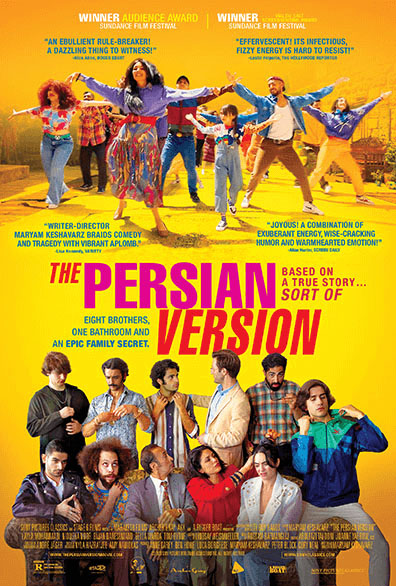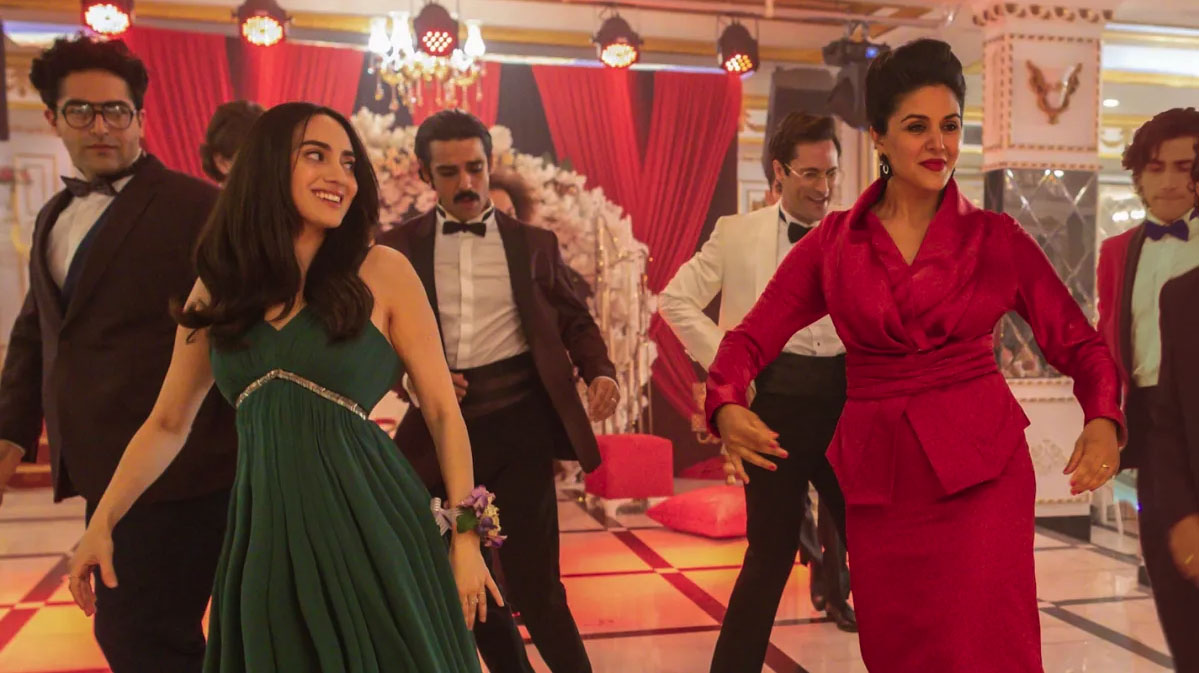The Persian Version is available in limited US theatrical release and select VOD.
Bavand Karim
The Persian Version is the third feature film from Iranian American director Maryam Keshavarz. The semi-autobiographical comedy about the director’s upbringing and family won the audience award at this year’s Sundance Film Festival. Keshavarz skillfully weaves a cross-cultural coming-of-age story that spans time and geography through the portraits of resilient women struggling through generational maternal trauma.
After lovesick lesbian Leila (Layla Mohammadi) becomes pregnant by her one-night stand Maximillian (Tom Byrne), the two strike up a reticent romance. In exploring Leila’s predicament, we meet her conservative parents and eight brothers. To them, Leila’s pregnancy is just another one of her scandals. As Leila determines to move forward by discovering the past, the film explores the shades of variation within Persian culture, its contradictions, and the values which lie at its heart. Most of all, the film celebrates the resilience and individualism of Iranian women across generations through Leila, her mother Shireen (Niousha Noor), and her grandmother (Bella Warda). Shireen’s own story is explored through a flashback sequence in which she is portrayed by Kamand Shafieisabet, who gives a performance that will surely catapult the young actress into wider recognition.
Keshavarz successfully navigates the unique challenge of portraying a country she is unable to visit herself. Her 2011 erotic thriller, Circumstance, about two Iranian women falling in love, caused Iranian officials to declare her an outlaw. The ban did not sway Keshavarz; She cast an international company of known and unknown actors who all reside outside of Iran and filmed in New Jersey, New York, and Mardin, Turkey to create a thoughtful exploration of inter-cultural gender identity.
 Keshavarz’s voice as an auteur is rooted in her expression of queer themes. The Persian Version exhibits the four traditional hallmarks of queer cinema: irony, theatricality, aestheticism, and humor. The story balances constant irony through “in-between-ness” presented in terms of ethnicity, gender identity, and cross-cultural expression. The performances and production design exude the campy over-the-top theatricality long associated with the best queer films like Hedwig and Rocky Horror Picture Show. The fantastically stylized representations of 1980s aestheticism disengage the audience from traditional moral rules and expectations. And the story’s use of humor as a coping mechanism when things get difficult is perhaps the most important message in the film — that beneath the pain and alienation experienced by marginalized communities, there remains irrepressible positivity and hope.
Keshavarz’s voice as an auteur is rooted in her expression of queer themes. The Persian Version exhibits the four traditional hallmarks of queer cinema: irony, theatricality, aestheticism, and humor. The story balances constant irony through “in-between-ness” presented in terms of ethnicity, gender identity, and cross-cultural expression. The performances and production design exude the campy over-the-top theatricality long associated with the best queer films like Hedwig and Rocky Horror Picture Show. The fantastically stylized representations of 1980s aestheticism disengage the audience from traditional moral rules and expectations. And the story’s use of humor as a coping mechanism when things get difficult is perhaps the most important message in the film — that beneath the pain and alienation experienced by marginalized communities, there remains irrepressible positivity and hope.
The director’s modern cinematic influences are apparent. The film operates as an homage to the gender-bending in-between-ness of Hedwig and the Angry Inch, John Cameron Mitchell’s virtuosic stage play that was adapted for cinema in 2001. Wes Anderson himself might be envious of the film’s vibrant colors and Keshavarz’s symmetrical mise-en-scène. Martin Scorsese would surely approve of the way Keshavarz breaks the fourth wall during transitional montages by having her characters speak directly to the audience. Every element within The Persian Version is a pastiche of America’s influence on Persian culture, right down to the cross-cultural restyling of Cyndi Lauper’s classic hit, “Girls Just Want to Have Fun.”
The Persian Version is an imperfect portrait of an imperfect family. The film leaves some of its characters undeveloped, and some of its threads untied. But it never fails to acknowledge the complexity of delicately balancing such meaningful and urgent issues, and it never strays from the theme that life’s most meaningful moments are often not the most celebrated or memorable ones, but the ones in between.




